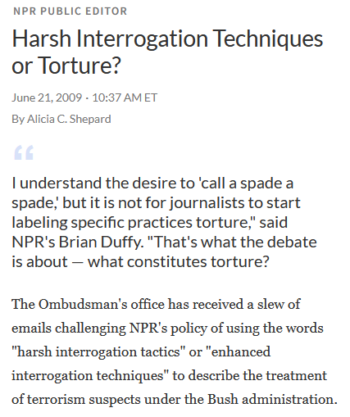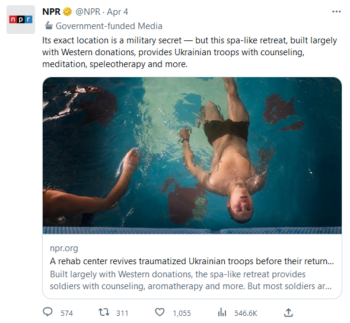
The Washington Post (4/5/23) questioned “the unsavory suggestion that [NPR‘s] reporting is tainted.”
NPR (4/5/23) rebuked the label, and major media rushed to the public broadcaster’s defense. “Twitter Slaps NPR With a Dubious New Tag: ‘State-Affiliated Media,’” read a Washington Post headline (4/5/23). Vanity Fair (4/5/23) lambasted the “false equivalence between NPR and state propaganda agencies.” CBS News (4/5/23), AP (4/5/23) and CNN (4/5/23) emphatically quoted NPR’s self-description as a purveyor of “independent, fact-based journalism.” The New York Times (4/5/23) offered an oblique criticism of Twitter’s labeling schemes under Musk as “unevenly enforced.”
The issue soon reached the White House. Press Secretary Karine Jean-Pierre avowed in a briefing (Forbes, 4/5/23) that “there’s no doubt of the independence of NPR’s journalists.” Reading from a script, Jean-Pierre continued: “NPR journalists work diligently to hold public officials accountable and inform the American people.”
All are right to impugn the whims of Musk, who, to all appearances, harbors a personal animus against NPR. Still, the outrage against Twitter’s policy is highly selective.
Double standards
Twitter introduced the “state-affiliated media” tag in August 2020, defining “state-affiliated media” as
outlets where the state exercises control over editorial content through financial resources, direct or indirect political pressures, and/or control over production and distribution.

Without being directly controlled by the state, CNN (8/6/20) knew not to quote the reaction of official enemies who were marginalized by Twitter.
The label disproportionately impacted countries the US deems adversarial, as numerous critics have observed, including Bryce Greene for FAIR (1/6/23). Upon implementing its labeling policy, Twitter identified platforms like Iran’s PressTV; Russia’s RT and Sputnik News; and China’s China Daily, Global Times, CGTN and China Xinhua News as “state-affiliated.” Meanwhile, legions of US and British media networks that met Twitter’s definition—among them the BBC, PBS, Voice of America and, of course, NPR—were spared the label on grounds of “editorial independence.”
This would have measurable effects on tagged media. As Twitter explained in August 2020:
We will also no longer amplify state-affiliated media accounts or their Tweets through our recommendation systems, including on the home timeline, notifications and search.
Subsequently, Chinese accounts with the “state-affiliated media” label “saw drops of over 20% per tweet” (Hong Kong Free Press, 1/21/21), while Twitter boasted that marked Russian accounts lost up to 30% of their circulation.
This was hardly unforeseeable. Yet leading US and UK media, far from their reproachful stances of recent days, offered little to no objection to Twitter’s initial labeling rubric. While Reuters (8/6/20) quoted one Russian official’s critique, CNN (8/6/20), Axios (8/6/20) and others saw no need to include the perspectives of impacted outlets and countries in their reporting, nor to underscore the blatant double standard. And, rather than condemn the policies as “unevenly enforced,” the New York Times didn’t publish the news at all. After all, Twitter’s algorithm was now further skewed in these outlets’ favor.
Thin defenses

NPR (4/5/23) objected to being lumped in with “official state mouthpieces and propaganda outlets in countries such as Russia and China.”
In its response to Twitter, NPR (4/5/23) vehemently disagreed with the decision, arguing that the label would liken the organization to “official state mouthpieces and propaganda outlets in countries such as Russia and China.” The broadcaster insisted that it “gets less than 1% of its annual budget, on average, from federal sources.”
The 1% figure reverberated throughout major media outlets, and prominent US journalists took to Twitter to cite the number as evidence that NPR was not “state-affiliated.” (Technically, the statistic is accurate, though a bit cherry-picked; on its website, NPR confirms the 1% figure, but states that its member stations, which contribute heavily to NPR’s operating budget, received a total of 13% of funding from federal, state and local governments in fiscal year 2020.)
One might wonder, though, how an organization can receive federal funding, even if a comparatively modest amount, and not be “state-affiliated.” One might also wonder whether these journalists would apply the same logic to an Iranian, Chinese or Russian outlet receiving the same portion of federal funding as NPR.
Moreover, contrary to NPR’s argument, a low federal funding total hardly proves “editorial independence.” Regardless of its financial breakdown, NPR’s body of reporting shows that the broadcaster is exactly the “mouthpiece” and “propaganda outlet” it so indignantly claims not to be.
State (and corporate) affiliations
Over the years, FAIR and other media critics have catalogued dozens of instances of NPR’s advancement of official state narratives.
In the early 1980s, under pressure from the Reagan administration, NPR gave a jingoistic slant to its coverage of the US’s war against Nicaragua, reassigning reporters who were “too easy on the Sandinistas,” and hiring a right-wing pundit, as Greg Grandin wrote in his 2007 book Empire’s Workshop.
But the broadcaster needed “no state coercion to toe Washington’s regime change line on Venezuela” (FAIR.org, 8/5/19) when it omitted mentions of devastating US sanctions in order to blame the country’s economic woes on “authoritarian President Nicolás Maduro,” and exalt US puppet and former self-declared president of Venezuela Juan Guaidó (NPR, 5/30/19). (Never mind that Maduro was democratically elected.)

NPR public editor Alicia Shepard (6/21/09) defended the use of euphemisms to describe torture committed by the US government, in part because “both presidents Bush and Obama have insisted that the United States does not use torture.”
NPR similarly echoed Washington when it ignored Seymour Hersh’s report that the US destroyed the Nord Stream pipeline, promoted baseless “Chinese spy balloon” conspiracy theories, minimized the US starvation of Afghan people after the US military’s withdrawal, obscured Israel’s ongoing violence against Palestinian people after journalist Shireen Abu Akleh’s murder, and euphemized US-committed torture post-9/11. (This summary is far from exhaustive; four of these examples are from just the last ten months.)
And NPR has no problem explicitly endorsing the US’s economic system. Ira Glass, host of NPR program This American Life, declared in 2015: “I think we’re ready for capitalism, which made this country so great. Public radio is ready for capitalism.”
If, say, a Cuban radio-show host beamed that “socialism” made Cuba “so great,” it would be hard to imagine the New York Times and company publishing fervent defenses of the associated broadcaster’s editorial independence.
Additionally, even when it’s not advancing official US narratives directly, NPR should raise eyebrows for its reliance on another, much greater, source of funding: corporations.
In 2022, NPR projected corporate sponsorship to be its largest source of revenue, providing nearly 42% of its income (Current, 11/30/22). And NPR’s corporate funders as of 2021 include a number of entities that often work in tandem with US intelligence agencies: Amazon, Facebook and Google, to name a very small fraction. To suggest that the broadcaster could be “editorially independent” simply because of minimal public funding—with no accounting for corporate influence—is misleading at best.
Right move, wrong reasons

Tweets from NPR now bear the designation “government-funded media.”
Following media’s outcry, Twitter edited NPR’s label from “state-affiliated media” to “government funded,” then “government funded media,” and affixed these labels (in the same sequence) to other qualifying Western outlets, including the BBC, PBS and Voice of America. But this softer descriptor is still selectively applied: Outlets in Iran, China, Russia, Cuba and other official enemies didn’t receive this update.
Were Twitter genuinely interested in educating the public about the influence of power on media, it might not award government-funded US and US-friendly publications their own label, separate from that attached to Official Enemies.
And it might account for the fact that the Washington Post’s and New York Times’ records of parroting US officials (Extra!, 3/14; FAIR.org, 5/24/19) should qualify those newspapers, too, as “state-affiliated media.”
It very likely won’t. Twitter’s decision to call attention to Western government–funded outlets is valid. But it’s also nothing more than a product of arbitrary, petty far-right grievance politics, curtailed only by the self-serving demands of corporate news outlets—the last thing that a true reckoning with the ideology of major US media needs.
The post US Media Denounce Twitter’s ‘State Media’ Label—When It Affects NPR appeared first on FAIR.
This content originally appeared on FAIR and was authored by Julianne Tveten.
Julianne Tveten | Radio Free (2023-04-11T21:04:05+00:00) US Media Denounce Twitter’s ‘State Media’ Label—When It Affects NPR. Retrieved from https://www.radiofree.org/2023/04/11/us-media-denounce-twitters-state-media-label-when-it-affects-npr/
Please log in to upload a file.
There are no updates yet.
Click the Upload button above to add an update.